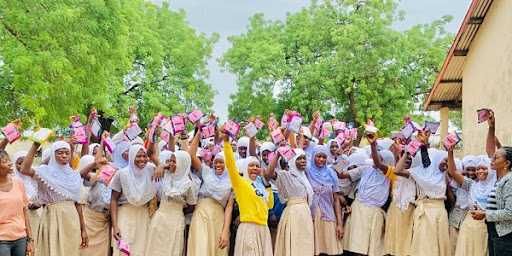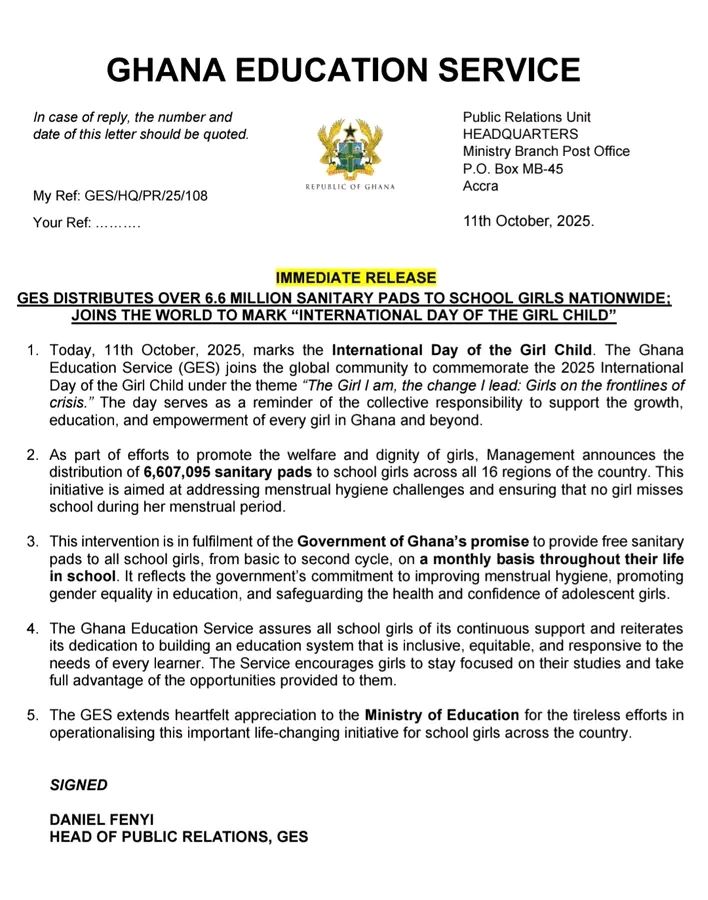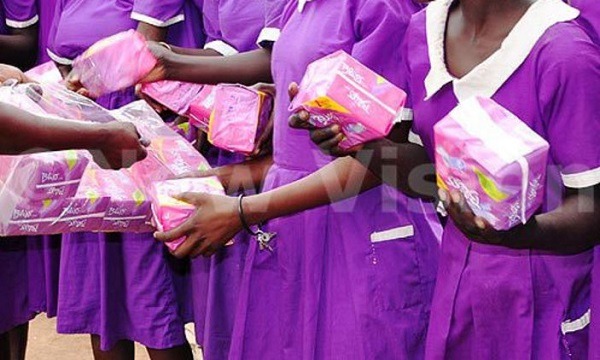Ghana has taken a significant step toward improving menstrual hygiene and gender equality in education as the Ghana Education Service (GES) distributed more than 6.6 million sanitary pads to schoolgirls across all 16 regions of the country. The initiative, announced on October 11, 2025, coincided with the global commemoration of the International Day of the Girl Child under the theme “The Girl I Am, the Change I Lead: Girls on the Frontlines of Crisis.”
The bold move forms part of the Government of Ghana’s long-standing commitment to ensuring that no girl misses school due to menstrual challenges — a barrier that has historically contributed to absenteeism and school dropouts among adolescent girls.
According to the GES press statement, signed by Daniel Fenyi, Head of Public Relations, the initiative aims to uphold the dignity and welfare of girls, especially those in deprived areas, by addressing one of the most overlooked aspects of female education: menstrual hygiene management.
The GES revealed that 6,607,095 sanitary pads were distributed to schoolgirls from basic to senior high levels, ensuring equitable access for learners across rural and urban communities. This intervention, the Service noted, fulfills a key government pledge to provide free sanitary pads monthly throughout girls’ schooling years, reaffirming Ghana’s dedication to inclusive and equitable education.

Officials say the program is a direct reflection of Ghana’s policy direction on gender equality and health empowerment, as outlined by the Ministry of Education. It also supports the UN Sustainable Development Goals (SDGs), particularly Goals 3 (Good Health and Well-being), 4 (Quality Education), and 5 (Gender Equality).
In many parts of Ghana, menstrual poverty, the inability to afford or access sanitary products, remains a major social and educational issue. Studies by UNICEF and Plan International Ghana show that 1 in 10 schoolgirls miss school during their menstrual cycle, primarily due to stigma, lack of sanitary materials, or inadequate facilities for menstrual hygiene. This initiative, therefore, represents not just a public health intervention, but a strategic educational policy.
Beyond providing pads, the GES statement underscores that the program also seeks to build confidence and self-esteem among adolescent girls, allowing them to participate fully in school activities without fear or shame. By maintaining consistent school attendance, girls can perform better academically and remain competitive with their male counterparts.
Educationists and social development experts have praised the initiative as timely and transformative. They note that menstrual hygiene is often a neglected topic in public policy despite its direct link to school attendance, academic performance, and gender equality. The GES’s approach—combining education with health intervention—demonstrates an understanding that academic success depends on social support structures, particularly for girls in rural and low-income communities.
The Ministry of Education was commended by GES for its “tireless efforts” in operationalising this “life-changing initiative.” The collaboration between both institutions is expected to be the first phase of a long-term plan that ensures menstrual equity becomes a permanent component of Ghana’s education system.
GES also used the statement to reaffirm its dedication to building an education system that is inclusive, equitable, and responsive to the unique needs of every learner. The Service urged girls to remain focused on their studies and take full advantage of every opportunity made available through government and community support.

For decades, Ghanaian girls, especially in rural and low-income areas, have faced severe educational disadvantages due to the stigma surrounding menstruation. Many are forced to skip school or drop out entirely due to the lack of sanitary products or privacy-friendly facilities. By distributing free pads nationwide, Ghana joins a growing number of African nations such as Kenya, Uganda, and South Africa, which have introduced government-funded menstrual support programs to promote gender equality in education.
Experts believe this initiative will also yield economic and social benefits, as increased school attendance among girls has been linked to delayed early marriage, higher lifetime earnings, and stronger family health outcomes.
As Ghana marked this year’s International Day of the Girl Child, the initiative stands as a powerful reminder of what inclusive policy can achieve. It reflects not only a commitment to improving menstrual hygiene but also to nurturing a generation of confident, educated, and empowered Ghanaian women who can lead in all spheres of national development.
Ultimately, this national effort to distribute over 6.6 million sanitary pads is more than a humanitarian gesture — it’s an investment in the future of Ghana’s daughters, an assertion of dignity, and a call to action for other nations to follow suit.
School Feeding Programme to Expand to Over 1,000 Pupils in Rural Basic Schools – Coordinator

